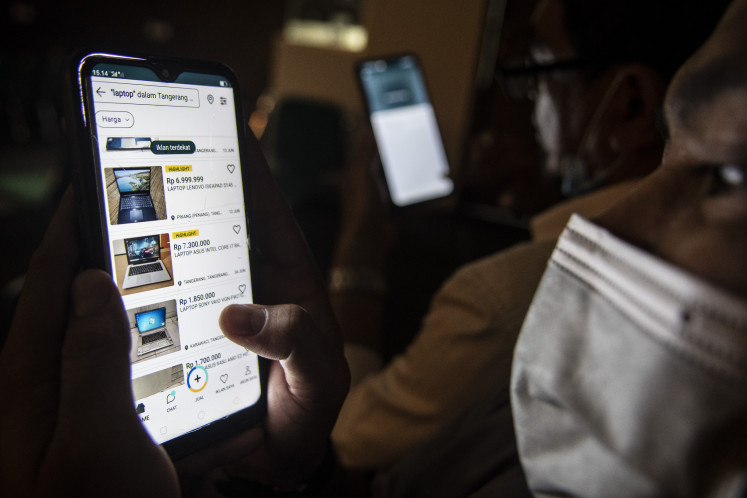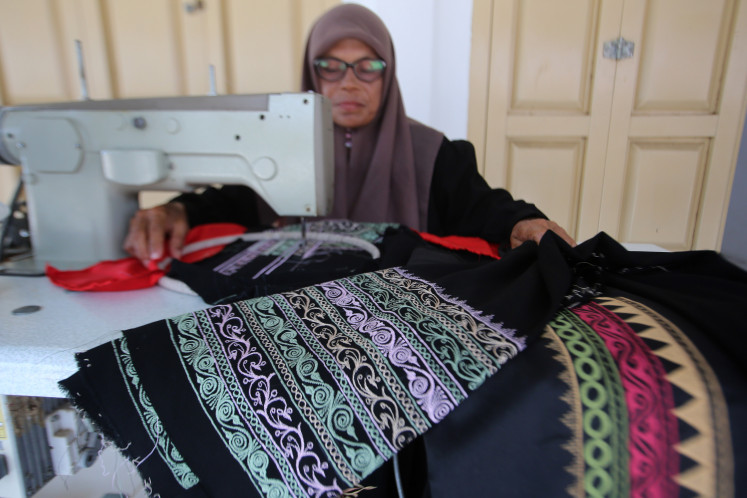Popular Reads
Top Results
Can't find what you're looking for?
View all search resultsPopular Reads
Top Results
Can't find what you're looking for?
View all search resultsSame plan, new excuses
Change text size
Gift Premium Articles
to Anyone
 Floating power: This aerial photo shows the newly built floating solar power plant that can generate 192 megawatts (MW) of peak electricity in cooperation between the Indonesian government and state-owned renewable energy company Masdar of the United Arab Emirates, at the Cirata Reservoir, West Java. (AFP/Bay Ismoyo)
Floating power: This aerial photo shows the newly built floating solar power plant that can generate 192 megawatts (MW) of peak electricity in cooperation between the Indonesian government and state-owned renewable energy company Masdar of the United Arab Emirates, at the Cirata Reservoir, West Java. (AFP/Bay Ismoyo)
T
he long-waited, and so-called “green”, long-term electricity business plan (RUPTL) is here, but it is not what we were hoping for.
President Prabowo Subianto's administration is at risk of making similar mistakes to those of the previous administration, which may prevent a boom in renewable energy in the coming years as he previously promised.
Despite claims it would prioritize green energy, the business plan frontloads fossil fuel-based power plants over the first half of the 10-year procurement plan with over 76 percent of the planned 16.6 gigawatts of coal and gas to be procured during this period.
Meanwhile, only 28 percent of the planned 42.6 GW of new and renewable power will be realized within the same period.
The bulk of renewable projects have been deferred until the last five years of the long-term plan.
However, their realization will depend on whether there is a significant increase in electricity demand in the future in line with the government projections.
The Energy and Mineral Resources Ministry and state-run utility company PLN based the business plan on an assumption that the economy will grow by 8 percent by the end of the Prabowo administration in 2029, which will eventually drive up electricity demand at roughly the same pace.
The problem is, it is hard to imagine the country arriving at a level of growth Indonesia has not seen consistently in over a decade with the Finance Ministry pointing out that 8 percent is an “optimistic scenario” rather than a baseline that the country will definitely achieve.
Even this year, economists project Indonesia’s economy to grow below the usual pace of 5 percent, a signal of further weakening demand.
In the past, former president Joko “Jokowi” Widodo's administration had set an ambitious 7 percent economic growth target only to see the realization fall far below government projections at around 5 percent annually over the past decade.
When the Jokowi administration tried to assume electricity demand would grow at roughly 7 percent as well, it ended up predicting a surge of electricity demand that never materialized.
The energy ministry data show that electricity demand only grew around 4.6 percent on average over the past decade.
For years, the oversupply has been the solid excuse for the ministry and PLN to either postpone or neglect additional renewables whose realization we should have seen by today.
PLN on multiple occasions has also blamed the oversupply as the cause of its financial stress, particularly due to take-or-pay contracts for this excess power, which has limited its ability to develop much-needed grid infrastructure that should have enabled the flow of renewables from remote areas to demand centers.
The share of renewables in the nation’s energy mix stood at 14.1 percent by the end of 2024, far from the 19 percent set by the government in order to reach the now defunct 23 percent target set for this year.
Given what the two have done with the new business plan, there is real risk that dozens of gigawatts of renewables planned for much later in the next decade could meet a similar fate.
If fossil fuel-based power plants continue to run at high capacity due to contractual obligations, renewable projects risk being curtailed or underutilized.
The risk has become apparent after the government and PLN in late 2023 opted for a far less ambitious coal phase-down that focused on reducing emissions from coal plants, while keeping them operational for longer, rather than retiring them early to make room for renewable energy projects.
We should expect that this will translate into uncertainty for investors seeking to develop renewable energy projects in Indonesia in the coming years.
The new RUPTL is a mixed signal. It gestures toward a cleaner future but its design still reinforces outdated dependencies.
The business plan risks becoming yet another missed opportunity in Indonesia’s long journey toward sustainable development, unless the government and PLN are willing to make real policies to truly create enabling conditions for clean energy investment.










